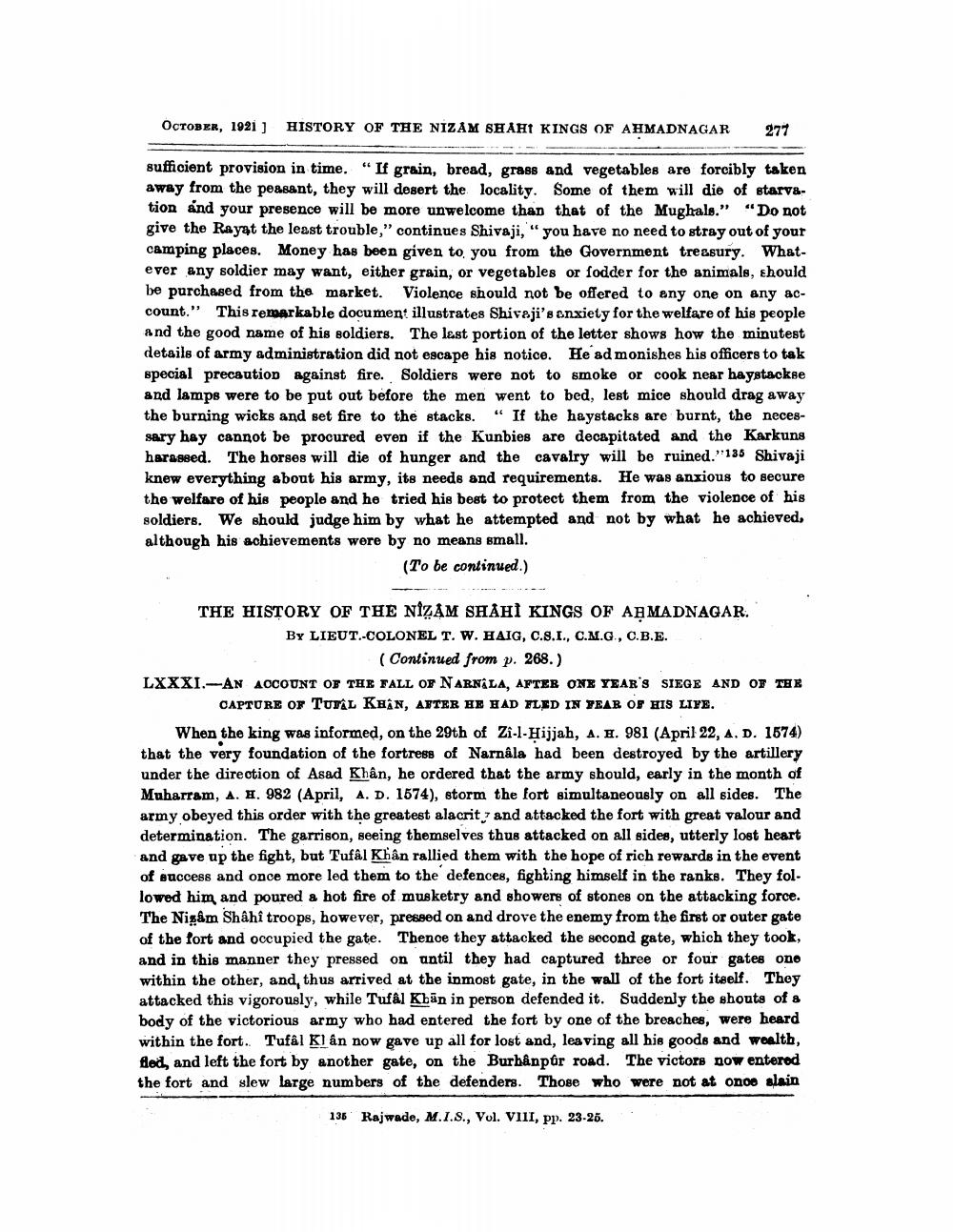________________
OCTOBER, 1921 ) HISTORY OF THE NIZAM SHAH KINGS OF AHMADNAGAR
277
sufficient provision in time. “If grain, bread, grass and vegetables are forcibly taken away from the peasant, they will desert the locality. Some of them will die of starvation and your presence will be more unwelcome than that of the Mughals." "Do not give the Rayat the least trouble," continues Shivaji," you have no need to stray out of your camping places. Money has been given to you from the Government treasury. Whatever any soldier may want, either grain, or vegetables or fodder for the animals, should be purchased from the market. Violence should not be offered to any one on any account." This remarkable document illustrates Shivaji's enxiety for the welfare of his people and the good name of his soldiers. The last portion of the letter shows how the minutest details of army administration did not escape his notice. He admonishes his officers to tak special precaution against fire. Soldiers were not to smoke or cook near haystackse and lamps were to be put out before the men went to bed, lest mice should drag away the burning wicks and set fire to the stacks." If the haystacks are burnt, the necessary hay cannot be procured even if the Kunbies are decapitated and the Karkuns harassed. The horses will die of hunger and the cavalry will be ruined."136 Shivaji knew everything about his army, its needs and requirements. He was anxious to secure the welfare of his people and he tried his best to protect them from the violence of his soldiers. We should judge him by what he attempted and not by what he achieved, although his achievements were by no means small.
(To be continued.)
THE HISTORY OF THE NIZAM SHAHI KINGS OF AHMADNAGAR. BY LIEUT.-COLONEL T. W. HAIG, C.S.I., C.M.G., C.B.E.
(Continued from p. 268.) LXXXI.-AN ACCOUNT OF THE FALL OF NARNALA, AFTER ONE YEAR'S SIEGE AND OF THE
CAPTURE OF TUTAL KHAN, AFTER HE HAD FLED IN YEAR OF HIS LIFE. When the king was informed, on the 29th of Zi-l-Hijjah, A. H. 981 (April 22, A.D. 1574) that the very foundation of the fortress of Narnâla had been destroyed by the artillery under the direction of Asad Khân, he ordered that the army should, early in the month of Muharram, A. 1. 982 (April, A. D. 1574), storm the fort simultaneously on all sides. The army obeyed this order with the greatest alacrity and attacked the fort with great valour and determination. The garrison, seeing themselves thus attacked on all sides, utterly lost heart and gave up the fight, but Tufal Khân rallied them with the hope of rich rewards in the event of success and once more led them to the defences, fighting himself in the ranks. They fol. lowed him and poured a hot fire of musketry and showers of stones on the attacking force. The Nisam Shâhi troops, however, pressed on and drove the enemy from the first or outer gate of the fort and occupied the gate. Thence they attacked the second gate, which they took, and in this manner they pressed on antil they had captured three or four gates one within the other, and thus arrived at the inmost gate, in the wall of the fort itself. They attacked this vigorously, while Tufal Kbān in person defended it. Suddenly the shouts of a body of the victorious army who had entered the fort by one of the breaches, were heard within the fort. Tufal Klän now gave up all for lost and, leaving all his goods and woulth, fled, and left the fort by another gate, on the Burhanpur road. The victors now entered the fort and slew large numbers of the defenders. Those who were not at once slain
136
Rajwade, M.I.S., Vol. VIII, pp. 23-25.




